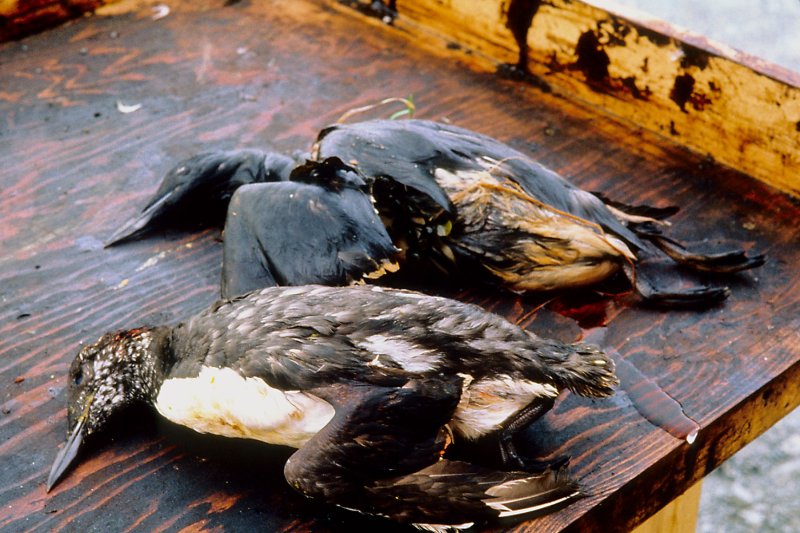NO RIP
Joseph Hazelwood, captain of Exxon Valdez during 1989 oil spill, dies at 75By Matt Bernardini

The Exxon Valdez spill in 1989 released almost 11 million gallons of crude oil into Prince William Sound off Alaska. It was devastating for the area and wildlife that lived there.
File Photo courtesy Exxon Valdez Oil Spill Trustee Council
Sept. 13 (UPI) -- Joseph Hazelwood, the infamous captain of a tanker vessel that ran aground off Alaska in 1989 and created one of the worst oil spills in human history, has died after a battle with cancer. He was 75.
Hazelwood's family told The New York Times and The Washington Post that the former captain died in July after a fight with cancer and COVID-19.
A longtime sailor, Hazelwood was navigating the Exxon Valdez when it abruptly ran aground in Alaska's Prince William Sound on March 24, 1989. The accident tore the vessel open and spilled nearly 11 million gallons of crude oil into the sound.
The spill devastated the area and killed wildlife that lived there, particularly those whose habitat was the waters of Prince William Sound. It damaged 1,500 miles of the Gulf of Alaska Coastline, killed 250,000 seabirds, 2,800 sea otters, 300 harbor seals, almost two dozen bald eagles and several killer whales.
Hazelwood was initially under suspicion of being intoxicated at the time of the spill, but he was cleared during a trial in 1990 in which witnesses said he appeared sober around the time the ship ran aground. After the spill, Exxon's chairman said that the company made "bad judgment" when it allowed Hazelwood, who'd been treated for alcoholism, to captain the Valdez.
"Someone in management should have been notified," the chairman said at the time. "Our policy would not have permitted this man back on the ship."
The Exxon Valdez disaster led to the passage of the Oil Pollution Act of 1990, which strengthened the Environmental Protection Agency's ability to prevent and respond to oil spills.
Sept. 13 (UPI) -- Joseph Hazelwood, the infamous captain of a tanker vessel that ran aground off Alaska in 1989 and created one of the worst oil spills in human history, has died after a battle with cancer. He was 75.
Hazelwood's family told The New York Times and The Washington Post that the former captain died in July after a fight with cancer and COVID-19.
A longtime sailor, Hazelwood was navigating the Exxon Valdez when it abruptly ran aground in Alaska's Prince William Sound on March 24, 1989. The accident tore the vessel open and spilled nearly 11 million gallons of crude oil into the sound.
The spill devastated the area and killed wildlife that lived there, particularly those whose habitat was the waters of Prince William Sound. It damaged 1,500 miles of the Gulf of Alaska Coastline, killed 250,000 seabirds, 2,800 sea otters, 300 harbor seals, almost two dozen bald eagles and several killer whales.
Hazelwood was initially under suspicion of being intoxicated at the time of the spill, but he was cleared during a trial in 1990 in which witnesses said he appeared sober around the time the ship ran aground. After the spill, Exxon's chairman said that the company made "bad judgment" when it allowed Hazelwood, who'd been treated for alcoholism, to captain the Valdez.
"Someone in management should have been notified," the chairman said at the time. "Our policy would not have permitted this man back on the ship."
The Exxon Valdez disaster led to the passage of the Oil Pollution Act of 1990, which strengthened the Environmental Protection Agency's ability to prevent and respond to oil spills.
"Had a spill the extent of the Exxon Valdez disaster occurred off the United States East Coast, the devastation would have stretched from Cape Cod to Chesapeake Bay," Walter Parker, head of the Alaska Oil Spill Commission, wrote not long after the spill.
Hazlewood was acquitted of a felony charge of operating a vessel while intoxicated, but was convicted of negligence. The court ordered him to perform 1,000 hours of community service and pay $50,000 in restitution.
Thousands of plaintiffs later sued Exxon and claimed they were significantly affected by the disaster. Five years after the spill, an Alaska jury awarded them $5 billion in punitive damages -- an amount that was later cut in half. The U.S. Supreme Court further reduced the award to $507 million in 2008.
Hazelwood wasn't even on the bridge when the ship ran aground, as he'd left his third mate in charge.
The National Transportation Safety Board found that the third mate failed to properly maneuver the vessel because of fatigue and excessive workload. Investigators also said Hazelwood failed to provide proper navigation. Hazelwood was the only person who was ever criminally charged for the oil spill.
The Exxon Valdez spill was the worst in U.S. history for more than 20 years before it was surpassed by the Deepwater Horizon disaster in 2010, which spilled almost 170 million gallons of crude oil into the Gulf of Mexico -- more than 15 times the amount that the Valdez spilled off Alaska 21 years earlier.
No comments:
Post a Comment